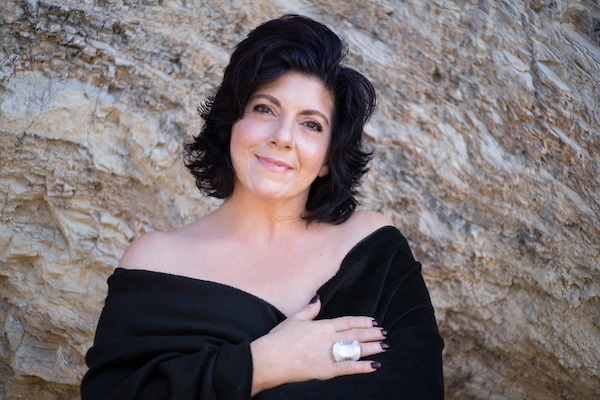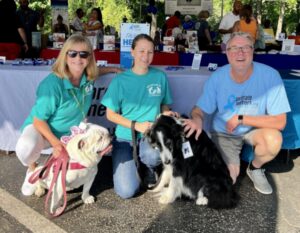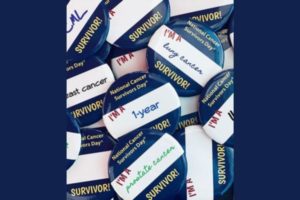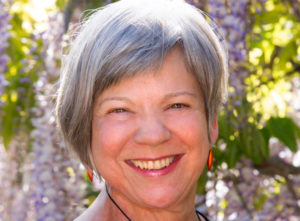[NCSD guest blog post by Carol Ann Manzi]

There I was on stage, singing for thousands. I had little confidence in myself or belief in my abilities. I was pursuing a career in opera, which required discipline not unlike training for the Olympics. Although my ego needed to be the size of a diva, my legs were often shaking under my grand and gilded costumes. On the outside, my trained voice was hitting all the notes, while my inner voice was like a screeching inferiority complex just looking to upstage me. Yet I always made my entrances on cue and became quite a successful leading lady.
Enter breast cancer, stage left. At just 34 years old, this was not an invited or welcome character on the stage that was my life. I’d endured years of rigorous voice training, even with persistently poor vocal health. I’d suffered bouts of asthma and persistent sinus infections and had become accustomed to the countless rejections and the stiff competition endemic to the music business. But quitter was never a word in my repertoire.
So, I accepted a contract to sing the biggest and hardest role of my career. I sang nine performances of it to rave international reviews – three months into chemotherapy. I was not about to miss one high note of my operatic life. My career was taking off with alacrity.
Then the curtain rose on another tragic act. My father died and my marriage collapsed, all in the same year. Suddenly, the floor under me gave way, and so did I. The scenery had been rearranged on me. I lost my identity, and under too much stress, I lost my voice as well. I could no longer play my role as Miss Manzi, Operatic Soprano. My momentum began to wane. I left my big-time New York City agent. This drama seemed to be over for me and not necessarily with my permission. It was time that I exited, stage left.
The treatments I faced included still more lumps being removed, poking, prodding, CT scans, MRIs, and the waiting that only cancer patients truly understand. My very life was playing out like a tragic opera. I was one-breasted and I was alone. I became depressed and listless. And after years of playing my parts and performing with the full regalia and low-cut costumes, now I was dying inside.
Then, I recalled those years long ago when I’d felt tenacious, courageous, and invincibly brave. My innate perseverance told me that it was not an option to crack on a high note. The opera that was my life was simply NOT going to end this way. It was time to take on a new role – one I could become, instead of just play. It was time to start another act and this leading lady was about to “enter stage right.”
I checked my diva-sized ego with its inferiority complex at the stage door. I became more aware of all the life that was happening around me. I was not a solo act on this stage called life. Everyone else had their own song to sing and those songs were often about loss. For cancer patients, those losses included body parts, hair, resplendent health, energy, relationships, jobs, and joy. Despite the chorus of well wishers chanting, “You’re so strong,” “Just think positive,” and “You’ll beat this,” constant fear and despair became, in the silence and loneliness of my room, an atonal duet that I couldn’t turn off.
The emergence of my new role seemed urgent now. I could use that hard-won voice of mine to comfort and soothe. I could sit with those who were in pain and fear. I could accompany the suffering. As it turned out, I wasn’t shaking under any costume anymore. I was unafraid.
I could use my extensive experience on the stage to speak to the masses about grieving, surviving, courage and persevering. I could help others to pick themselves up, dust themselves off, and get back on the stage that is their life. I could inspire people to sing their new song, for I was, at long last, discovering my own.
For this new role, I didn’t need virtuosity anymore. I only needed my heart.
As a leading lady, I’ve received a lot of standing ovations for the roles I’ve sung on the opera stage. The roles of cancer and life survivor, though, have been far harder to learn and to perform. But learn them I have. And today seems like a good day to give my new roles that standing ovation. One that is more poignant, more personal, and more meaningful.
Shakespeare said, “All the world’s a stage and we are but the players,” and another great thinker said, “Life is not a dress rehearsal.” If you’re reading this, you are surviving something. So now it’s time for YOU to sing your new song, and to give YOURSELF that standing ovation!
Carol Ann Manzi, MM is a breast cancer survivor, award-winning operatic soprano, Yale graduate, philanthropist, and inspirational speaker. You can find Carol Ann at manzispeaks.info




